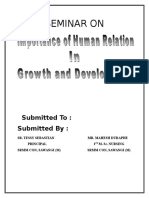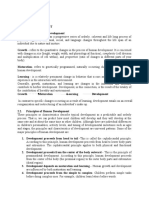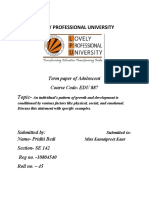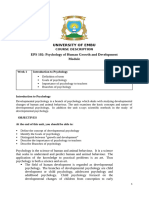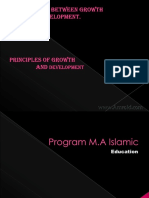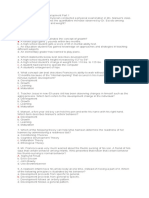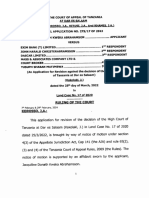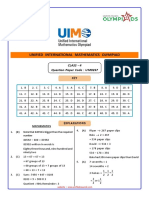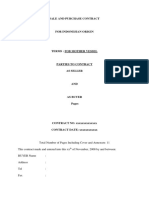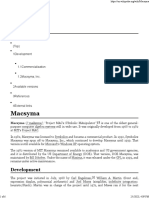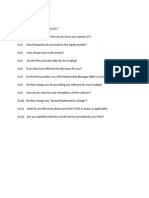Physical Education Chapter 9 - Psychology and Sports Notes
Physical Education Chapter 9 - Psychology and Sports Notes
Uploaded by
Zoya Ul haqCopyright:
Available Formats
Physical Education Chapter 9 - Psychology and Sports Notes
Physical Education Chapter 9 - Psychology and Sports Notes
Uploaded by
Zoya Ul haqCopyright
Available Formats
Share this document
Did you find this document useful?
Is this content inappropriate?
Copyright:
Available Formats
Physical Education Chapter 9 - Psychology and Sports Notes
Physical Education Chapter 9 - Psychology and Sports Notes
Uploaded by
Zoya Ul haqCopyright:
Available Formats
Chapter 10 Psychology
and Sports
(a) Psychology: Psychology is the study of mind and behavior
Direction everywhere
(b) Sports Psychology: Sports Psychology is an applied Psychology involving applications of
psychological principles to the field of physical education and sports.
(c) Importance of sports psychology
(d) Growth and Development: Growth “The term growth of parts of the education means the growth
of parts of the body, may be in size, height and weight. Development can be defined as
progressive series of changes in an orderly coherent pattern.
(e) Different stages of growth and development
5 stages of growth and development
Infancy (0 to 5 years)
Early childhood (6 to 9 years)
Late childhood (9 to 12 years)
Adolescence (12 to 18 years)
Adulthood or Maturity (18 yrs onwards,)
(f) Adolescence, Problems of Adolescence and Management of Problems of Adolescents
Adolescence: Adolescence is the period of change from childhood to adulthood
Management of Problems of Adolescence
Sympathetic and Liberal attitude of parents
Healthy atmosphere at home and school
Paper knowledge of Adolescence psychology
Proper sex education
Channelization of energy in right directions.
(g) Define Learning, Laws of learning and Transfer of learning
Learning: Learning is a life-long process: it starts in the womb and ends in the tomb.
Learning is adaptation and adjustment.
Transfer of learning, Types of Transfer of learning, factor affecting transfer of learning Transfer of
learning: Transfer of learning occurs when a person’s learning in one situation influence his
learning and performances in other situation
(i) Positive Transfer–When there is an improvement in a performance as a result previous
learning or training
(ii) Negative Transfer–When learnt one skill makes learning of the second skill more difficult
(iii) Application Transfer–When previous learning is applied successfully to life situations
(iv) Bilateral Transfer–When there is a change of performance in a number on one side of the body
as a result of training the corresponding member on other side
(v) Proactive Transfer–learning of a skill affects the learning of a skill yet to be learnt.
(vi) Retroactive Transfer–A skill recently being learnt affects the previously learnt skill.
(h) Plateau and causes of Plateau
Plateau- A period of little or no apparent progress in an individual’s learning, marked by an inability
to increase speed, reduce number of errors etc. and indicated by a horizontal stretch in a learning
curve or graph.
(i) Concept of emotions and methods of controlling emotions.
Emotions: Emotions are intense feeling that are directed at someone or somethings. Emotions are
subjective conscious experiences characterised by expressions, biological reactions and mental status.
You might also like
- Educ. - 1-A Rudy 22Document26 pagesEduc. - 1-A Rudy 22Mary Rose Ponte Fernandez90% (39)
- CBRC Child - AdoslescentDocument139 pagesCBRC Child - AdoslescentJunior Hayden ConarcoNo ratings yet
- LuciaDocument2,204 pagesLuciaAna Clara Aliprande OliveiraNo ratings yet
- Pedia Normal Set1 (Final)Document20 pagesPedia Normal Set1 (Final)Yaj Cruzada50% (2)
- Human Adaptation and Social ChangeDocument51 pagesHuman Adaptation and Social ChangeJoshkorro Geronimo75% (12)
- Phy 10Document3 pagesPhy 10AniketNo ratings yet
- Material Downloaded From and Portal For CBSE Notes, Test Papers, Sample Papers, Tips and TricksDocument3 pagesMaterial Downloaded From and Portal For CBSE Notes, Test Papers, Sample Papers, Tips and TricksAkash100% (1)
- Basic Concepts in Child DevelopmentDocument19 pagesBasic Concepts in Child DevelopmentJA Loayon BeberinoNo ratings yet
- 10th Bio Topic 1 TO 8Document66 pages10th Bio Topic 1 TO 8Dev BajariaNo ratings yet
- XI ch-9 QUEDocument7 pagesXI ch-9 QUEHunter BstNo ratings yet
- Developmental TheoriesDocument13 pagesDevelopmental TheoriesElise HowardNo ratings yet
- PsychologyDocument75 pagesPsychologyashaNo ratings yet
- EPS 102 Human G&D Otes 4Document78 pagesEPS 102 Human G&D Otes 4jonesdere53No ratings yet
- 10 PE CHA. 1 NOTES 2023 Question AnswersDocument8 pages10 PE CHA. 1 NOTES 2023 Question AnswersDev BajariaNo ratings yet
- Children 09 01369 v2Document9 pagesChildren 09 01369 v2Pap RobertNo ratings yet
- Principles of Growth and DevelopmentDocument3 pagesPrinciples of Growth and Developmentreshell kwin ramosNo ratings yet
- m1 - Prof Ed Notes - UpdatedDocument10 pagesm1 - Prof Ed Notes - UpdatedTeresita Leonido100% (1)
- Career MaturityDocument5 pagesCareer Maturitydominator1985No ratings yet
- Psy 311 Notes 2021Document147 pagesPsy 311 Notes 2021austinoyugi08No ratings yet
- Human Relation SeminarDocument22 pagesHuman Relation Seminardanimon1984No ratings yet
- Course 506 (AutoRecovered)Document30 pagesCourse 506 (AutoRecovered)mannrupanshi6No ratings yet
- Erica R. de Guzman Bsed-Social StudiesDocument4 pagesErica R. de Guzman Bsed-Social StudiesElmer R. De GuzmanNo ratings yet
- Psychological Foundation of Learning 2016Document42 pagesPsychological Foundation of Learning 2016hunderaeshetu868No ratings yet
- C2 Human DevelopmentDocument11 pagesC2 Human DevelopmentHanan FuadNo ratings yet
- 8610Document19 pages8610Muhammad ZakriaNo ratings yet
- Children and AdolescentsDocument12 pagesChildren and AdolescentsErica Joy Tan QuintanaNo ratings yet
- Psychology and SportsDocument8 pagesPsychology and SportscherrydevmNo ratings yet
- Growth and DevelopmentDocument23 pagesGrowth and DevelopmentDr. Parmvir SinghNo ratings yet
- Integ01 MIDTERM ASSIGNMENTDocument9 pagesInteg01 MIDTERM ASSIGNMENTjerico gaspanNo ratings yet
- Integ01 FINAL ASSIGNMENTDocument9 pagesInteg01 FINAL ASSIGNMENTjerico gaspanNo ratings yet
- Week 2 Lecture SlidesDocument14 pagesWeek 2 Lecture Slidesmaswanganyemasingita17No ratings yet
- PSYC 111-NotesDocument67 pagesPSYC 111-Notesgracemaweu23No ratings yet
- CHAPTER 5 GROWTH & DEVELOPMENT (Part 1)Document51 pagesCHAPTER 5 GROWTH & DEVELOPMENT (Part 1)ASNAIRA LAKIMNo ratings yet
- EDUC 145 Module 1 Unit 1Document31 pagesEDUC 145 Module 1 Unit 1kikikitchiNo ratings yet
- Ped 221 Developmental PsychologyDocument42 pagesPed 221 Developmental PsychologymubarakNo ratings yet
- Detailed Lesson Plan in HE7Document12 pagesDetailed Lesson Plan in HE7aifeclovis001No ratings yet
- DLL MAPEH-6 Q1 W2-September-7 HealthDocument3 pagesDLL MAPEH-6 Q1 W2-September-7 HealthLarachiel AltamarinoNo ratings yet
- Ed 101 Child and Adolescent Learners and Learning PrinciplesDocument5 pagesEd 101 Child and Adolescent Learners and Learning Principlescrystaljade.refuerzo18No ratings yet
- Lovely Professional University: TopicDocument17 pagesLovely Professional University: Topicladdi4uNo ratings yet
- Child Growth and DevelopmentDocument11 pagesChild Growth and DevelopmentMarvin Yebes ArceNo ratings yet
- The Essence of Development and Growth: By: MHD Sholeh Kurniawan NSTDocument19 pagesThe Essence of Development and Growth: By: MHD Sholeh Kurniawan NSTSholeh KNo ratings yet
- BrainDance Review PaperDocument9 pagesBrainDance Review PaperSantiago ValderramaNo ratings yet
- Psychology Semester 2 PDFDocument221 pagesPsychology Semester 2 PDFTulasi BlessNo ratings yet
- Part 1Document1 pagePart 1Heart WpNo ratings yet
- Foundations of EducationDocument35 pagesFoundations of EducationEdmar PerveraNo ratings yet
- Group 1. Introduction To Human DevelopmentDocument12 pagesGroup 1. Introduction To Human DevelopmentNoah GeorgeNo ratings yet
- Concept of Growth and Development and PeincipleDocument6 pagesConcept of Growth and Development and PeincipleHarish Kumar Kumawat100% (1)
- ProfEd Questions With Rationale For OnlineDocument31 pagesProfEd Questions With Rationale For OnlineIdris HermanNo ratings yet
- CH - 9, P. Edu CLASS 11Document25 pagesCH - 9, P. Edu CLASS 11Chandan YadavNo ratings yet
- Child and Adolescent DevelopmentDocument13 pagesChild and Adolescent DevelopmentDianne Angelie CayabyabNo ratings yet
- Module 1Document23 pagesModule 1Bulan BulawanNo ratings yet
- Child and Adolescent Dev IntroDocument17 pagesChild and Adolescent Dev IntroKimay DanielNo ratings yet
- SEM-II solved questionsDocument22 pagesSEM-II solved questionsomchoudhury208No ratings yet
- Human Growth and DevelopmentDocument27 pagesHuman Growth and DevelopmentbinuscariasdbNo ratings yet
- E.P.S 102 Psychology NotesDocument23 pagesE.P.S 102 Psychology Notesjonesdere53No ratings yet
- Child and Adolescent Devt (50 Items)Document8 pagesChild and Adolescent Devt (50 Items)abigail libunao100% (1)
- Chapter 4: Movement: The Keystone of Physical Education and SportDocument18 pagesChapter 4: Movement: The Keystone of Physical Education and SportAnonymous GzRz4H50FNo ratings yet
- Growth and DevlopmentDocument23 pagesGrowth and DevlopmentAnil MenzNo ratings yet
- REVIEWER Child-and-Adolescent-Development-Prof - EdDocument46 pagesREVIEWER Child-and-Adolescent-Development-Prof - EdKristine Joyce Nodalo100% (1)
- Child and Adolescent Development ProfDocument9 pagesChild and Adolescent Development ProfEricka joy conarcoNo ratings yet
- L1-L3 CALLP ModuleDocument7 pagesL1-L3 CALLP ModuleMelanie ClenuarNo ratings yet
- SAFE RING Flange GuardDocument11 pagesSAFE RING Flange Guardsushil kumar guptaNo ratings yet
- A Middle Eastern Feast by Amina Al-SaighDocument112 pagesA Middle Eastern Feast by Amina Al-SaighK Kowalski100% (1)
- MD, Mendez - No Revision Lies Against Interlocutory Order, Jacquiline Donath Kweka Abrahamson v. Exim BankDocument15 pagesMD, Mendez - No Revision Lies Against Interlocutory Order, Jacquiline Donath Kweka Abrahamson v. Exim BankPrince Mwailwa SmithNo ratings yet
- Your Nakshatra Is PURVABADRADocument4 pagesYour Nakshatra Is PURVABADRABarbie KapoorNo ratings yet
- PDFenDocument7 pagesPDFenJimmeey GondaaNo ratings yet
- Lecture 4 Load Transfer and Failure Mechanism of Bolt ConnectionsDocument15 pagesLecture 4 Load Transfer and Failure Mechanism of Bolt ConnectionsAbhiroop BhandariNo ratings yet
- MATHS UIMO Paper 9257 SolutionDocument5 pagesMATHS UIMO Paper 9257 SolutionMadhuri P.MNo ratings yet
- Technical Data Sheet: DescriptionDocument5 pagesTechnical Data Sheet: DescriptiongldiasNo ratings yet
- Chapter 1Document41 pagesChapter 1CharleneKronstedtNo ratings yet
- HVAC KnowledgeDocument4 pagesHVAC Knowledgejun dongNo ratings yet
- Renegade User GuideDocument17 pagesRenegade User GuideLuiz HenriqueNo ratings yet
- Sale and Purchase ContractDocument11 pagesSale and Purchase ContractAktafian MJ100% (1)
- EXCAVATOR CAT 330D2L SpecalogDocument32 pagesEXCAVATOR CAT 330D2L Specalogganendra santantika100% (1)
- GRR 08 September 2024Document2 pagesGRR 08 September 2024xaliqovbilalNo ratings yet
- Macsyma - WikipediaDocument6 pagesMacsyma - Wikipedialakis lalakis888No ratings yet
- Branch ColorsDocument7 pagesBranch ColorsG LiuNo ratings yet
- Udemy Investor Presentation Q1 2022Document37 pagesUdemy Investor Presentation Q1 2022lukaNo ratings yet
- Prudential Vs RapanotDocument12 pagesPrudential Vs Rapanotmondaytuesday17No ratings yet
- QuestionnaireDocument15 pagesQuestionnaireSuman DasNo ratings yet
- Nike 2Document29 pagesNike 2Wilson PintoNo ratings yet
- 80 120 Kva PDFDocument81 pages80 120 Kva PDFBuonQuaBuonQuaNo ratings yet
- Fe Del Mundo Was Born in Manila On November 27Document2 pagesFe Del Mundo Was Born in Manila On November 27Dannica Ignacio AbsalonNo ratings yet
- The Usages of Kinship Address Forms Amongst Non Kin in Mandarin Chinese: The Extension of Family SolidarityDocument30 pagesThe Usages of Kinship Address Forms Amongst Non Kin in Mandarin Chinese: The Extension of Family SolidarityRichardNo ratings yet
- File Cbse Class 10 Imp Q Triangles 1583492715Document7 pagesFile Cbse Class 10 Imp Q Triangles 1583492715ShanmugasundaramNo ratings yet
- OOW Must Call or Inform The Master: Photograph by FedericoDocument2 pagesOOW Must Call or Inform The Master: Photograph by FedericoClyleo Eddard YoupaNo ratings yet
- Kit Se Sensores ArduinoDocument42 pagesKit Se Sensores ArduinoOmar Tintilay100% (1)
- Unit 4 Reading Plus LessonDocument2 pagesUnit 4 Reading Plus LessonMayra Alejandra Murcia CastroNo ratings yet
- Brochure Sample1Document2 pagesBrochure Sample1api-533738398No ratings yet



















